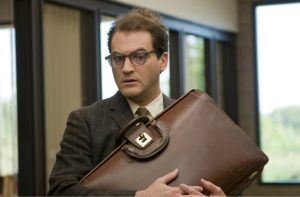A Serious Man
Posted on February 9, 2010 at 8:00 am
Larry Gopnik (theater actor Michael Stuhlbarg) is a physics professor in 1967 Minneapolis. He covers a blackboard the size of a movie screen with equations, confidently lecturing his students about the uncertainty principle but outside the classroom unable to cope with the uncertainty all around him. He can explain that Schrodinger’s (hypothetical) Cat inside a box may be both dead and alive, but he has a much harder time understanding his wife (who is leaving him), a student who may be attempting to bribe him for a better grade, the tenure committee that will decide his professional fate, all of which has him feeling as though he is in a box and both dead and alive, too. Larry’s son does not seem to care about anything but being able to watch the western sitcom “F Troop.” His daughter seems to spend all of her time washing her hair. His brother (Richard Kind) seems to be either a genius or completely mad, but in either case he does not seem capable of living on his own. Larry wants to be a serious man, and he wants some answers.
So, like a character in a fable or a fairy tale, he brings his questions to three rabbis, a young one who wants him to see everything as an expression of God’s will, an experienced one who tells him a mesmerizing but pointless story about a non-Jew’s teeth and tells him to do good works, and one who is very old and remote and is too busy thinking to talk to him. Internally, he becomes more stressed but his reactions are passive and conciliatory. The audience feels a sense of helplessness and dread as it seems we are more aware of the disasters heading for Larry than he is. A record company calls to tell him he needs to pay for the records he ordered. He says he has not ordered anything and they tell him that under the terms of their agreement not doing anything means ordering. And Larry is as poorly equipped to resolve that problem as he is to stop his wife from leaving him for a neighbor who somehow has the confidence, admiration, and deference he wishes for. Throughout the movie, there are many close-ups of ears, but no one seems to be listening to what is going on in front of them. He goes up on the roof to adjust the antennae, but still has trouble receiving the signal.
Under pressure, he begins to make some compromises that are contrary to his values, and that increases his stress and sense of losing control. As he searches for some sense of meaning or connection or even (he is a scientist after all) rationality, he does not realize that the answer is what he tells his students: that everything is uncertain but you are still responsible for it on the midterm.
Much has been made of the fact that for the first time Joel and Ethan Coen have made a film with autobiographical elements. Like Larry’s children, the Coen brothers grew up in a Jewish suburb of Minneapolis in the 1960’s, and like Larry, their father was a professor. But you get the feeling that they have once again appropriated and embraced and tweaked a genre just for the fun of it, and that it has no more meaning to them than any of the others. As Larry says, the stories are just illustrative; the math is how it really works.
Once again, as with Wes Anderson, meticulous and imaginative production design and a level of opacity far beyond most mainstream releases is often confused with profundity. Perhaps this is an ink blot for us to project our own questions on. Or perhaps it is their version of what Larry tells his students, and our midterm is coming up.

